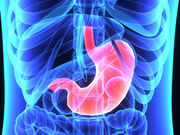Reductions in glucagon, cortisol, catecholamine, and sympathetic nerve responses to hypoglycemia
TUESDAY, June 28, 2016 (HealthDay News) — Gastric bypass (GBP) surgery is associated with reduced symptoms and neurohormonal responses to hypoglycemia, according to a study published online June 16 in Diabetes.
Noting that GBP patients have lowered glucose levels and frequent asymptomatic hypoglycemic episodes, Niclas Abrahamsson, M.D., Ph.D., from Uppsala University in Sweden, and colleagues examined symptoms and hormonal and autonomic nerve responses in patients exposed to hypoglycemia before and after GBP. Twelve obese patients without diabetes underwent hyperinsulinemic hypoglycemic clamp before and after GBP surgery.
The researchers found that after surgery the Edinburgh Hypoglycemia symptom delta scores during clamp were attenuated from 10.7 to 5.2. Marked reductions in glucagon, cortisol, catecholamine, and sympathetic nerve responses to hypoglycemia were seen after surgery. A delayed response was seen in growth hormones, but to a higher peak level. During hypoglycemia, glucagon-like peptide-1 and gastric inhibitory peptide increased, but to a lesser extent after surgery.
“GBP surgery causes a resetting of glucose homeostasis, which reduces symptoms and neurohormonal responses to hypoglycemia,” the authors write. “Further studies should address the underlying mechanisms as well as their impact on the overall metabolic effects of GBP surgery.”
The study was partially funded by Exodiab.
Full Text (subscription or payment may be required)
Copyright © 2016 HealthDay. All rights reserved.








